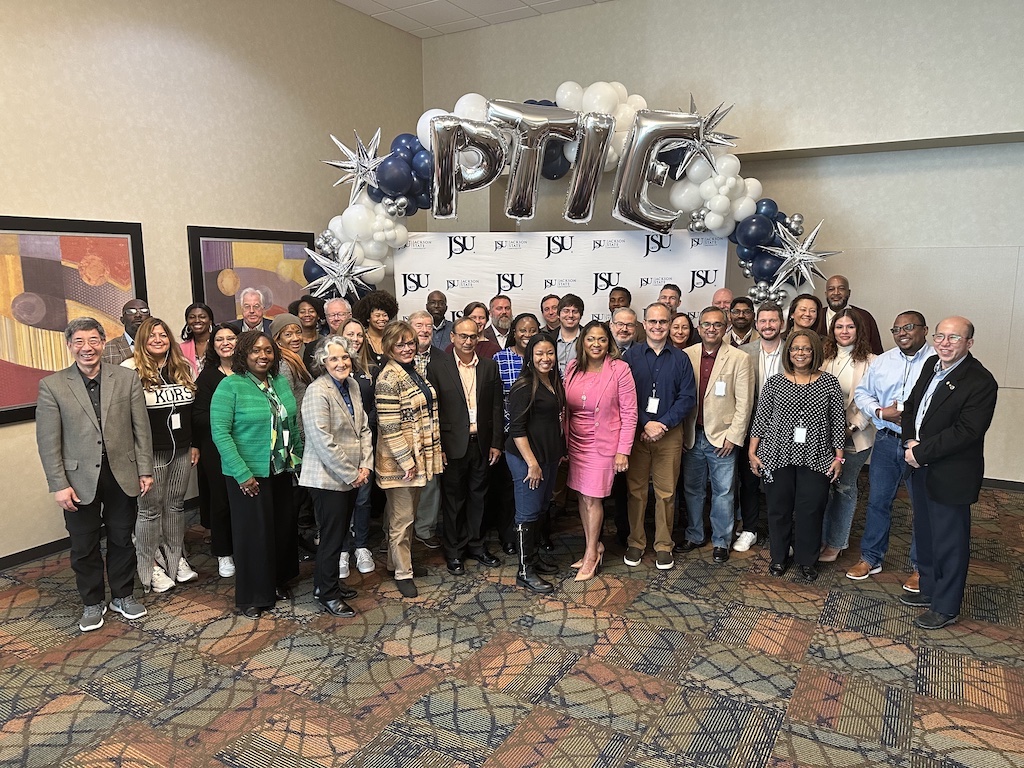By L.A. Warren
Jackson State University recently hosted a two-day mini-summit and workshop called Promotion & Tenure – Innovation & Entrepreneurship (PTIE). The global PTIE movement provides a playbook for reforming career advancement guidelines and practices and incentivizes faculty to create products that impact society. The initiative is led by Oregon State University (OSU) with support from the National Science Foundation (NSF). Participants mainly consisted of two dozen academic institutions from throughout the U.S.
A workshop included a gap analysis and action plan to help organizations apply PTIE to their rubric. Participants pinpointed key stakeholders and influencers for buy-in, listed on- and off-campus allies, identified individuals of resistance and reviewed other approaches. Among participating institutions included Alabama State University, Georgia State University, Hampton University, Huston-Tillotson University, Mississippi State University, Rowan University, Spelman College, The University of Southern Mississippi, University of Georgia, and VentureWell.
JSU Provost and Senior Vice President for Academic Affairs Alisa Mosley, Ph.D., said that keeping pace with policies and procedures for evaluating the faculty’s work had been a daunting task. In the past, “we’ve received questions from committee members and early-career faculty members about what counts and what doesn’t. With the advent of PTIE, we have found a way to truly recognize and value the great work that our faculty members are engaged in.” Additionally, Mosley said PTIE “simplifies the evaluation process and allows JSU to be more agile and responsive.”
Almesha L. Campbell, Ph.D., assistant vice president for JSU’s Division of Research and Economic Development, has been a driving force behind PTIE. She expressed enthusiasm for the movement and emphasized the significant support PTIE has received from institutions of all sizes, corporate partners, federal agencies, and nonprofit organizations. “Three years ago, plans for PTIE were initiated, and we didn’t anticipate the level of support we would receive,” Campbell said. She praised OSU for its role in shaping the initiative’s goals and building a coalition for maximum results.
OSU’s Rich G. Carter, Ph.D., is a professor of chemistry and faculty lead for Innovation Excellence in the Office of Research. He said the concept of PTIE wasn’t well known when planning began in 2020 during COVID when the group discussed challenges and opportunities via Zoom. “Our initial step was surveying around 400 institutions to gauge the demand for this initiative. It quickly became evident that this was an urgent issue for our country, with around 70 percent of respondents expressing its importance.”
Carter added, “In these times of separation and division, this program serves as a unifying force. It reminds people that they are valued, and the key is to ensure that the criteria are in place to prevent oversight. It’s been a problem for a long time, but the solution is clear: reward faculty for contributing to what we want them to achieve. It’s not about making a lot of money; it’s about having an impact and demonstrating the value of universities to society. When we ensure that the impact is achieved, the money will follow.”
Furthermore, Carter said, “The PTIE playbook is not limited to R1 or R2 institutions. I would even argue that it can apply to other organizations as well. The key is to have the senior-level support and the ground-up interest to ensure success. It’s a difficult process, but the playbook provides a step-by-step guide for campuses to follow. Reforming promotion and tenure is often considered the ‘third rail’ of academics, a topic no one dares to touch. The fear of change was pervasive because the solution was missing. Fortunately, that’s changing now, and various movements are aligning to drive the necessary reforms.”
Campbell and Carter described keynote speaker Pamela McCauley, Ph.D., as a catalyst for PTIE. After all, McCauley was the architect behind the initial funding for the program when she worked as a program officer at the NSF. Campbell also credited McCauley for funding JSU’s Innovation and Entrepreneurship program that began in 2016.
In her message, McCauley said it’s “essential” for the Academy to embrace PTIE and to realize that students are eager to become innovators and entrepreneurs. “Universities are under increasing pressure to demonstrate their relevance as the competition for students grows. We must show why we matter. Some students are even avoiding traditional university education in favor of online options or specialized training programs like Google certifications. We need to provide technical education that benefits from government-supported research to address societal challenges. We must be part of their entrepreneurial journey.”
Furthermore, McCauley said, “Supporting the innovation economy will strengthen our nation. Global leadership is achieved when we create useful products and services and disseminate knowledge that can be put into action. There are not many institutions that do not have innovation as part of their mission, and we must recognize the importance of encouraging and rewarding faculty for contributing to our economic impact.”
McCauley said innovation and entrepreneurship can co-exist with traditional scholarly activities, although she acknowledges potential hurdles at first. “The delicate conversation with resistant or senior faculty members should begin by explaining how education and society have changed and why it is crucial to adapt to remain relevant. Efforts to change reward models will encourage more faculty to embrace innovation and entrepreneurship.”

